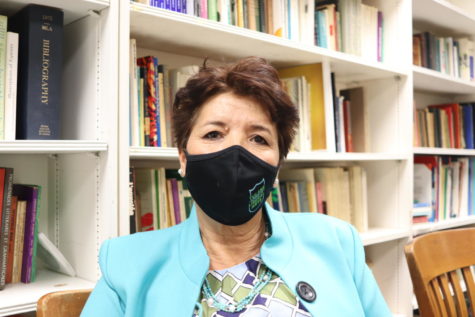Khedidja Boudaba’s life of service, journalistic excellence
Khedidja Boudaba — a professor of Arabic and French at Tulane University — has been a journalist, translator and educator in Algeria, Ethiopia, Washington D.C. and now New Orleans.

Boudaba was one of five daughters raised by a single mother and was the first in her family to go to college.
“The lives of the women around me were really my strongest motivation to forge ahead and do what I needed to do, not to stay there,” Boudaba said.
After graduating from the University of Algiers and working as a translator, Boudaba turned her attention to a more autonomous career: journalism.
Boudaba entered the field of journalism during the onset of the Algerian Civil War was beginning, which led to dangerous working conditions.
“Some colleagues stopped showing up for work because they decided they didn’t want to die from a stray bullet,” Boudaba said.
Prior to the war, Boudaba was not afraid to write and publish what she wanted, but the war shed light on how her coworkers could be untrustworthy.
“We became scared of everyone,” she said. Colleagues became suspicious of each other, and people had to become more careful about what they said and wrote in the office.
Boudaba faced increased challenges being a woman.
“I really resented [having] to fight for everything. I had to fight with my editor for the work that I am doing because in a country like Algeria, there’s a lot of censorship. You were never sure if you were going to prevail or get punished,” Boudaba said.
Her duty as a reporter sometimes conflicted with her obligation as a citizen. “As a reporter you’re always trying to report facts, but you cannot separate yourself really from what is happening in your country, especially when it is something that is so crucial for your future for the future of the country that you love,” Boudaba said.
Boudaba attempted to be involved in the political process, but censorship in Algeria limited her capabilities. After the assassination of the Algerian President Mohammed Boudiaf, Boudaba was sent to interview the accused murderer, Lambarek Boumaarafi; however, the experience wasn’t what she thought it would be. According to Boudaba, military personnel monitored the interview and prevented Boudaba from asking the questions she wanted or from receiving unchanged answers from Boumaarafi.
Reporters faced limitations in their line of work, as well as their livelihoods, as journalism was becoming increasingly dangerous. In 1988, riots in Algeria against the government became violent. The military opened fire on protesters, and hundreds died. One of them was Boudaba’s boss.
Algeria’s political climate continued to worsen. In 1992, the military cancelled democratic elections, and the government began to fight with the Islamic Salvation Front, a radical group trying to take over the government. The war had officially begun, and Boudaba knew it was time to leave.
“All these dead people, all the violence, it was so difficult,” Boudaba said.
Boudaba made her way to the U.S. through the Fulbright Program at the University of Maryland, continuing her work as a journalist. Even 5,000 miles away, Boudaba continued to fight for Algeria.
While interning for the Associated Press, she attended a news conference where a representative for the Islamic Salvation Front was speaking. People asked the man why the Algerian government was killing supporters, and he responded by claiming that the reporters were actually spies.
“I just stood up and I said, ‘I do not represent the government, I am an Algerian reporter, I have lived this… and he is lying,’” said Boudaba. “The people who have been killed are my friends, I know them one by one. They are not government informants, and I know you can kill me when I leave but I am not going to let you get away with this.’”
Boudaba feared that speaking her truth would lead to her family in Algeria being harmed.
Boudaba felt welcomed when she immigrated to the U.S., but she recognizes that the state of immigration today is drastically different.
“I feel so so sorry for the immigrants from Afghanistan and other places that are coming to the U.S. [at] this time… When I came it was a different atmosphere,” Boudaba said. “I know that there are a lot of people helping the Afghans. I want to help them every way I can, but I just know it’s not the same atmosphere.”
Your donation will support the student journalists of Tulane University. Your contribution will allow us to purchase equipment and cover our annual website hosting costs.




Leave a Comment